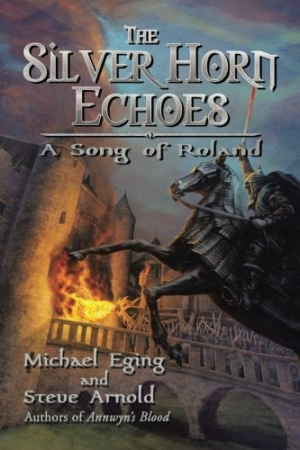The Silver Horn Echoes
A Song of Roland
This excellent historical tale is driven by action and heart-pounding heroism.
The Silver Horn Echoes by Michael Eging and Steve Arnold is a sweeping historical epic that is rich in its characters, plot, and legend.
Built around the exploits of its hero, Roland, around 801 CE, the novel explores how the Franks, under King Charles, fought on two fronts. The Saxons represented pressure from the north, while the Saracens pushed up through Barcelona, planning to conquer their way through the kingdom. Religion and faith are at stake as well as land and human conquests, pitting Christianity against both Norse paganism and Islam.
Charles isn’t safe within his own enclave, either. Roland’s stepfather, Ganelon, a descendant of the king of Clovis, is determined to unseat the king and take the throne, believing that Charles is a usurper. Roland suspects that Ganelon murdered Roland’s father, William. William’s specter haunts Roland and his mother, and Roland counts on his ghost for advice.
Roland is the type of glorious hero who is capable of stirring deep loyalty in his followers. Intelligent, with a sense of humor and a sense of compassion, handsome, and graced with superior fighting skills, Roland commands his father’s former marchmen (in spite of Ganelon’s machinations) and becomes Charles’s champion and trusted advisor.
Roland is not a perfect lead; he has a temper, he can be impulsive, and diplomacy is not his strong suit. Yet he is as loyal to his followers as they are to him, and he is willing to die for what he believes. His flaws support his strengths, making him an interesting, engaging character. His friends are equally complex and interesting, and it makes sense that they are drawn together, trusting each other with their lives.
Roland’s story is framed by Joachim, William the Conqueror’s bard, singing the Song of Roland in 1066 CE on the South Coast of Britain, prior to the battle that earned him his fame and title. The authors are skillful enough to make the device work as a support rather than an intrusion.
The writing throughout is bright and crisp, integrating action with history in a way that is informative without slowing down the story. The “silver horn” of the piece is the Oliphant, the horn Charles blows for his victories, given to Roland as he defends the rearguard one last time against the Saracen invaders and which finds its way over the centuries to William.
War’s brutality and its human cost are detailed. Sensory detail, both in and out of battle, makes the text visceral and immediate.
The Silver Horn is an excellent historical tale driven by action and heart-pounding heroism.
Reviewed by
Eva Schegulla
Disclosure: This article is not an endorsement, but a review. The publisher of this book provided free copies of the book and paid a small fee to have their book reviewed by a professional reviewer. Foreword Reviews and Clarion Reviews make no guarantee that the publisher will receive a positive review. Foreword Magazine, Inc. is disclosing this in accordance with the Federal Trade Commission’s 16 CFR, Part 255.

